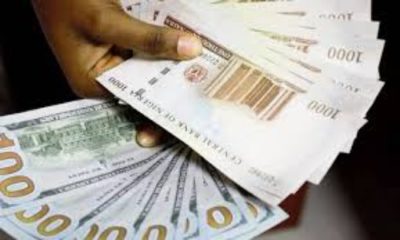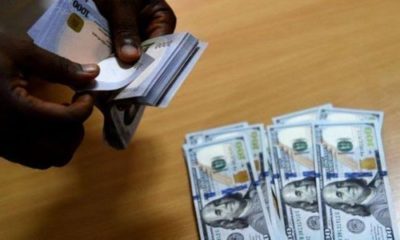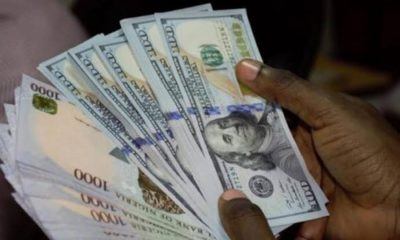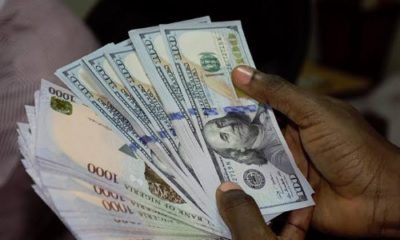Finance
Again,Naira in free fall, slides to 280 against dollar

ABUJA-THE naira continued its free fall on Thursday, crashing to 280 against the United States dollar at the parallel market. The greenback sold for N269 on Wednesday.
The naira, which had been trading around 241 and 243 against the greenback for a long time, began a steady decline about three weeks ago when the Central Bank of Nigeria stopped the sale of foreign exchange to over 1,600 Bureaux De Change operators due to improper documentation.
 On Wednesday, however, the CBN cut the amount it sold to each of the 2,270 BDCs that participated in the weekly forex sale to $10,000, down from the $30,000 it sold to them last week.
On Wednesday, however, the CBN cut the amount it sold to each of the 2,270 BDCs that participated in the weekly forex sale to $10,000, down from the $30,000 it sold to them last week.
According to analysts, the significant cut in forex supply to the BDCs coupled with the existing huge unmet demand at the CBN official window has led to the recent pressure on the naira at the parallel market.
Businesses have been struggling to access dollars as the CBN rations the greenback to preserve the country’s external reserves, which stood at $29.46bn as of December 15.
Analysts said the continued fall of the naira against the US currency at the black market could cause further inflation and affect businesses negatively with much backlash for the economy.
At the official interbank market, the currency has been pegged since February and closed at 196.97 on Wednesday.
Economic and financial experts have linked the continued fall of the naira at the parallel market to several reasons, ranging from the administrative controls imposed by the central bank to the speculative demand for the dollar by individuals and businesses.
They, however, said that unless the CBN took major steps to address the situation as soon as possible, the naira might be headed for 300 against the dollar.
A number of economists, who spoke to our correspondent on Thursday, said the devaluation of the naira was inevitable.
“Naira at 280 against the dollar at the parallel market is more speculative than being market-driven. The reason for this continued fall can be linked to a combination of factors. Well, the naira should find its equilibrium,” the Chief Executive Officer, Financial Derivatives Limited, Mr. Bismarck Rewane, said.
Rewane had said that the devaluation of the naira was inevitable considering the margin between the value of the currency at the official market and the parallel market.
The Managing Director, Eczellon Capital, an investment bank and research firm, Mr. Diekola Onaolapo, said that considering the continued pressure on the local currency, “devaluation of the naira seems almost inevitable; we may need to devalue.”
He, however, said the current pressure on the currency might also be linked to the end-of-the-year rush, which bordered on foreigners having the need for dollars to travel out of the country for vacation.
Onaolapo is also of the opinion that the latest pressure on the naira may not have any major macroeconomic backlash on the economy.
The Head, Research and Investment Advisory, Afrinvest West Africa, Mr. Ayodeji Ebo, said the N80 spread between the value of the naira at the official and parallel markets would breed round-tripping and other sharp practices, calling on the CBN to take steps to address the situation by devaluing the naira.
He said, “The unrelenting slide in the value of the naira can be attributed to the hawkish administrative forex policies of the CBN to safe the naira. These policies are now a sting in the tail as businesses are struggling to survive.
“The CBN needs to be realistic in its strategies given that the main source (crude oil) of its forex has continued to wane. Unless a deliberate effort to devalue the naira by a minimum of 25.0 per cent to N248.6/US$1.00 (our forecast) within the next few weeks to reduce the arbitrage between the official market and parallel (unofficial) market, we would not be surprise to see the naira trade around N300.00/US$1.00. The existing spread (over N80.00/US$1.00) has incentivized round-tripping among major players in the forex market.”
Currency strategist at Ecobank Nigeria, Mr Kunle Ezun, linked the naira’s freefall at the parallel market to supply problem.
The Head of Portfolio Investment at Meristem, a research and investment advisory firm, Mr. Taiwo Yusuf, said, “The administrative controls are not working. We cannot wish away the demand. The administrative controls imposed by the CBN are making it difficult for us to have a stable naira.
“We are pushing ourselves towards being a productive economy but we are not yet there. We may need to take steps that will help to attract foreign portfolio investments into the country and keep them here for the main time. Otherwise, the current situation may bring imported inflation and hurt to businesses.”
However, the Director, Monetary Policy Department, CBN, Mr. Moses Tule, blamed the action of speculators on the pressure being suffered by the naira in the foreign exchange market.
Tule said in a statement that the naira was under pressure as a result of the actions of speculators, whom he noted had taken positions on the naira with a view to making excess gain from currency trading.
He said the currency speculators were determined to put severe pressure on the monetary authorities in order to ensure that the CBN further devalued the naira.
The CBN, according to him, has a responsibility to manage the economy and will do anything to protect it from those he described as “economic predators.”
While maintaining that the only rate in the currency market was N196.47 to a dollar, he wondered why indigenous operators in the Bureau de Change segment of the market chose to make huge profits at the expense of customers in genuine need of the currency.
Tule said, “We know what the fundamentals of this economy are and we will continue to take the right economic decisions on what to do and not when people sitting out there speculating on the currency think the naira should be devalued so that they could make profit out of it.
“No country quotes its exchange rate with reference to the BDCs rates. The currency has a reference rate and that is the interbank exchange rate.”
PUNCH-
Banking
CBN Denies Currency Devaluation

The Central Bank of Nigeria (CBN) has refuted claims of devaluing the.
Earlier reports suggested that the CBN had devalued the Naira, lowering its exchange rate from N631 to the dollar, compared to the previous day’s rate of N461.60 at the Importers and Exporters (I&E) window.
However, the Central Bank of Nigeria (CBN) released a statement on Thursday through its Acting Head of Corporate Communications, Dr. Isa Abdulmumin, categorizing the report as false information.
In the statement titled ‘CBN Has Not Devalued The Naira’, he said the attention of the apex bank was drawn to the news report by an Abuja based newspaper edition of June 1, 2023, titled “CB Devalues Naira To 630/51”.
However, the CBN stated categorically that the news report was replete with outright FALSEHOODS and destabilizing innuendos, ‘reflecting potentially willful ignorance of the said medium as to the workings of the Nigerian Foreign Exchange Market.’
“For the avoidance of doubt, the exchange rate at the Investors’ & Exporters (I&E) window traded this morning (June 1, 2023) at N465/USS1 and has been stable around this rate for a while.
“The public is hereby advised to ignore the news report by Daily Trust in its entirety, as it is speculative and calculated at causing panic in the market,” the CBN spokesman added.
He, therefore, advised media practitioners to verify their facts from the Central Bank of Nigeria before publishing in order not to misinform the public.
Banking
BREAKING: CBN Increases Interest Rate By 0.5%

The interest rate in Nigeria has been raised to 18.5 percent, up by 0.5 percent, from 18 percent where it was pegged in March 2023.
The Central Banks of Nigeria’s (CBN) Monetary Policy Committee (MPC) resolved to this effect at its third meeting of 2023 in Abuja, on Wednesday.
Governor, CBN, Godwin Emefiele, made the disclosure in the communiqué of the MPC’s meeting, thereafter.
While engaging the media at the end of the two-day meeting, Emefiele, said the committee voted to keep the asymmetric corridor at +100 and -700 basis points around the MPR.
In the view of the MPC, rising inflation rate is traceable to the high energy cost and challenges around the supply chain, among others, which lie outside the corridors of the CBN.
Emefiele said, “The current trend in price development would continue to be monitored by the bank with greater collaboration with fiscal authority to address the drivers of inflation.”
Biztellers reports that the CBN had effected six consecutive interest rate increases, which has seen the rate move from 11.5 percent in March 2022 to 18.5 percent in May 2023.
Finance
Dangers Lurk As Nigerians Resort To Refurbished Gas Cylinders

In Nigeria, people have been forced to come up with creative solutions to cope with the effects of inflation and the economic crisis.
These improvised strategies have not only helped individuals save money, but also enabled them to stay afloat during difficult times.
In a concerning development, the recent trend of boycotting the high cost of cooking gas cylinders in Nigeria may pose a greater risk to lives than it does in terms of saving money.
Economy&Lifestyle investigations have revealed that the soaring prices of gas cylinders have reached a point where it has become increasingly challenging for average households to afford them, let alone refill them with gas.
The situation is further exacerbated by the fact that the pump price of kerosene, which would typically serve as an alternative, has become prohibitively expensive.
Upon investigation, it was found that the prices of gas cylinders vary depending on their sizes. A 3kg gas cylinder is priced at N14,000, while a 5kg cylinder costs N16,000. The larger cylinders are even more costly, with a 6kg cylinder priced at N17,000 and a 12.5kg cylinder costing N19,000.
Additionally, the expense continues when it comes to filling these cylinders with cooking gas, as it costs N2,600 for a 3kg cylinder, N5,200 for a 6kg cylinder, N8,950 for a 10.5kg cylinder, and N10,650 for a 12.5kg cylinder.
Consequently, an average household that needs to replace a worn-out 5kg cylinder would have to come up with N20,250 to purchase a new cylinder and fill it with gas, which can be a difficult feat to achieve.
As a result, many people have resorted to refurbishing their old cylinders and trying to use them as best as they can. However, this approach poses a significant danger.
Mrs. Rukayat Adesoji, a trader, shared her experience regarding her gas cylinder, which had become rusted and could no longer stand upright since last month. Due to the exorbitant prices of purchasing new cylinders, she resorted to seeking the assistance of a welder.
The welder patched the legs of the cylinder, repainted it, and ever since then, she has been using the refurbished cylinder for her cooking needs.
She said ““My gas cylinder which was 6kg got rusted and no longer stands erect since last month. When I asked for the price, I was told it was N17, 500. I was discussing it with a friend who advised me to take it to a welder to paint it and construct a new stand. I heeded to her advice and at the end spent just N3, 000 to turn my cooking gas to a brand new.”
Apart from refurbishing cylinders, some people don’t even know when their cylinders will expire. Mrs. Mercy Opara, a hair stylist, falls in that category as she explained: “I am taking my gas cylinder to the welder to spray it for me. It just cost N1, 500.
“The cost of buying a new cylinder is high. I have been using my cylinder for over 7 years and I don’t even know the expiry date. I just pray God blesses me so that I can buy a new one. But this one I am managing will look neat after spraying it for another two years.”
Mr. Adekanbi Joseph, a wielder, said he paints cylinder and “To paint and rebuild a cylinder stand, I charge N4, 500. Many people come here to paint as a new cylinder is now very expensive to get.”
Highlighting the potential dangers of using refurbished cylinders, Mr. Benjamin Hope, the Chief Executive Officer of FKT Cooking gas and general goods, emphasized the risks involved.
He stated that even a brand new cylinder can pose a risk of explosion if the locks are not properly secured after use or if the cylinder filled with gas is moved from one location to another.
He said “A brand new cylinder can explode if the locks are not well keyed after using and if the cylinder filled with gas was moved from one place.
“There are many reasons for the high cost of gas cylinders in Nigeria. One is the cost of importation due to the exchange rate. Another is the increased migration from the use of kerosene to cooking gas which has necessitated increased demand for gas cylinders. You know that in such a case there will be increased importation of cylinders.”he added



















